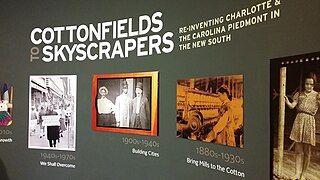Levine Museum of the New South

The Levine Museum of the New South, is a history museum located in Charlotte, North Carolina whose exhibits focus on life in the North Carolina Piedmont after the American Civil War. The museum includes temporary and permanent exhibits on a range of Southern-related topics.[1] Founded in 1991 as the Museum of the New South, it was renamed after museum patron and Family Dollar founder Leon Levine in 2001.[2]
Overview
The museum's permanent exhibit is called "Cotton Fields to Skyscrapers: Charlotte and the Carolina Piedmont in the New South", and features period displays that reflect regional history. The displays include a one-room tenant farmer's house, a cotton mill and mill house, an African-American hospital, an early Belk department store, and a civil-rights era lunch counter. Changing exhibits focus on local culture, art and history.[3]
In March 2013, the Charlotte Museum of History announced plans to move its administrative offices to the Levine Museum.[4]
In 2019, the museum had an exhibit "The Legacy of Lynching: Confronting Racial Terror in America", prepared in collaboration with the Equal Justice Initiative, who created the National Memorial for Peace and Justice.[5]
Gallery
-
Entrance of Levine Museum of the New South
-
Entrance of "Cottonfields to Skyscrapers"
-
Cotton-Machine
-
Model of plantation
-
Welcome-Sign for President Roosevelt
-
Explanation-Sign
-
Model of Bank of America Corporate Center
References
- ^ An Enigmatic Land of Great Expectations, Edward Rothstein, New York Times, Feb. 12, 2012.
- ^ [1]
- ^ [2] Archived 2016-10-22 at the Wayback Machine Levine Museum: Cotton Fields to Skyscrapers. From 1865 to today.
- ^ Price, Mark (March 9, 2013). "History museum to give up its building: New director will take over the mostly shuttered Charlotte history center". The Charlotte Observer. p. 1B.
- ^ Arrowood, Maddy (May 31, 2019). "Exhibit traces legacy of lynching in North Carolina through the stories of victims".
External links
35°13′41″N 80°50′20″W / 35.2279618°N 80.8389033°W







